Natural garden pest repellents are made from organic ingredients in your pantry or garden. Using these alternatives instead of synthetic pesticides can create a healthier plant environment. Using natural garden pest repellents is paramount when maintaining a healthy and thriving home garden. These repellents offer an effective and eco-friendly solution to control pests without harming the environment or endangering beneficial insects.
One key reason for using natural pest repellents is to protect your plants from damage caused by pests. You can effectively deter and prevent these pests from decimating your garden using natural pest control methods. Furthermore, using natural garden pest repellents helps to maintain a balanced ecosystem within your garden. Natural pest control solutions for plants allow you to target specific pests while safeguarding the overall health of your garden ecosystem.
Best Natural Garden Pest Repellents
Understanding the Importance of Pest Control in Home Gardens
Maintaining a healthy and thriving garden is every gardener’s dream. However, pesky pests can quickly turn this dream into a nightmare. That’s where pest control comes in. By understanding the importance of pest control in home gardens, you can protect your plants and ensure their well-being. Garden pests like aphids, slugs, and caterpillars can wreak havoc on your precious plants by feeding on leaves, stems, and fruits or vegetables. This compromises the aesthetic appeal of your garden and affects its overall productivity.
Implementing effective pest control measures helps to prevent these unwanted intruders from infesting your garden. It allows you to maintain a balanced ecosystem where beneficial insects thrive while keeping harmful pests at bay. By practicing regular pest control techniques, you can pinch potential infestations in the bud before they become major problems. Early pest detection and prevention are key to tackling pests effectively.
The Benefits of Using Natural Pest Repellents in Your Garden
Using natural pest repellents in your garden offers numerous benefits. Firstly, they are safe for the environment and pose no harm to animals or humans when used as directed. Unlike chemical pesticides that leave residues on plants, natural repellents break down quickly without leaving behind any toxic substances.
In case you missed it: Pest Management in Cotton Farming: Natural, Biological, and Chemical Control
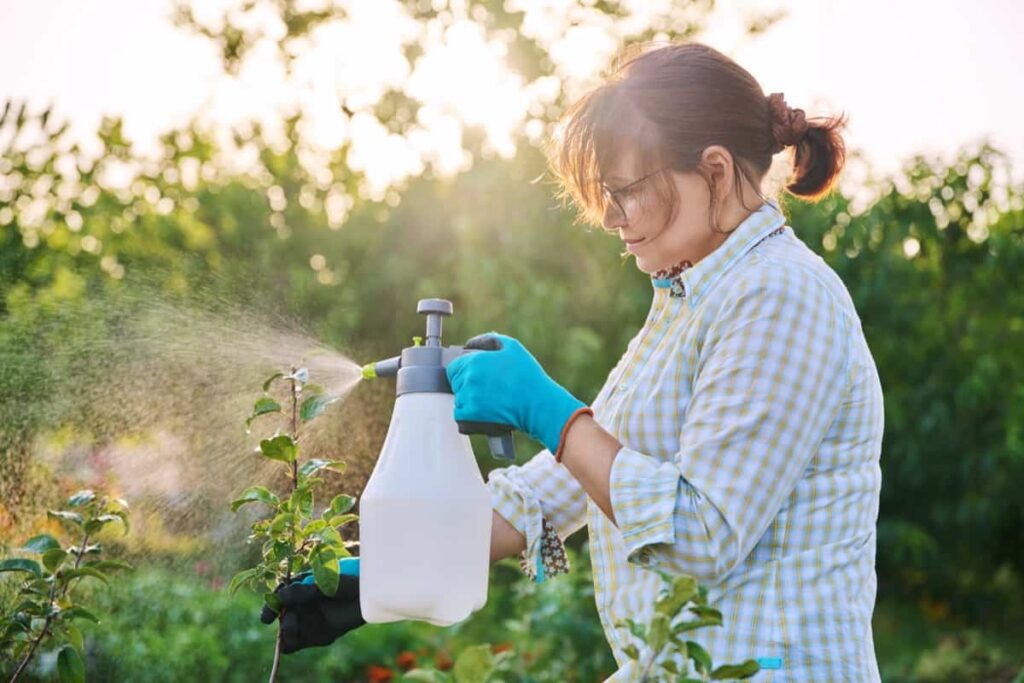
Furthermore, natural garden pest repellents promote biodiversity by preserving the population of beneficial insects such as ladybugs, bees, and spiders that help control pests naturally. By using organic pest control for home garden methods, you create a balanced ecosystem within your garden. Another advantage is cost-effectiveness. Many commercial pesticides can be expensive, especially if you have a large garden or frequent infestations.
Homemade organic repellents are often made with inexpensive ingredients such as essential oils or kitchen staples like garlic and chili peppers. Using natural garden pest repellents encourages sustainable gardening practices while reducing reliance on chemicals harmful to the environment and human health. It promotes an eco-friendly approach that respects nature’s delicate balance.
Essential Oils as Effective Natural Garden Pest Repellents
One popular essential oil for natural garden pest repellent is peppermint oil. Its strong scent deters common garden pests like ants, aphids, and spiders. Dilute peppermint oil in water and spray it around your plants to keep these unwanted visitors away. Another effective essential oil is lavender oil. Not only does it have a lovely fragrance, but it also repels insects like mosquitoes, moths, and fleas.
You can create homemade bug sprays for garden plants by mixing lavender oil with water or use sachets filled with dried lavender near your garden beds. Citronella oil is well-known for repelling mosquitoes and is a natural bug repellent for plants. You can naturally deter these pesky bugs without harmful chemicals by planting citronella grass or using citronella candles or torches in your outdoor space.
In case you missed it: Natural Beehive Pest Management: Effective and Eco-Friendly Solutions
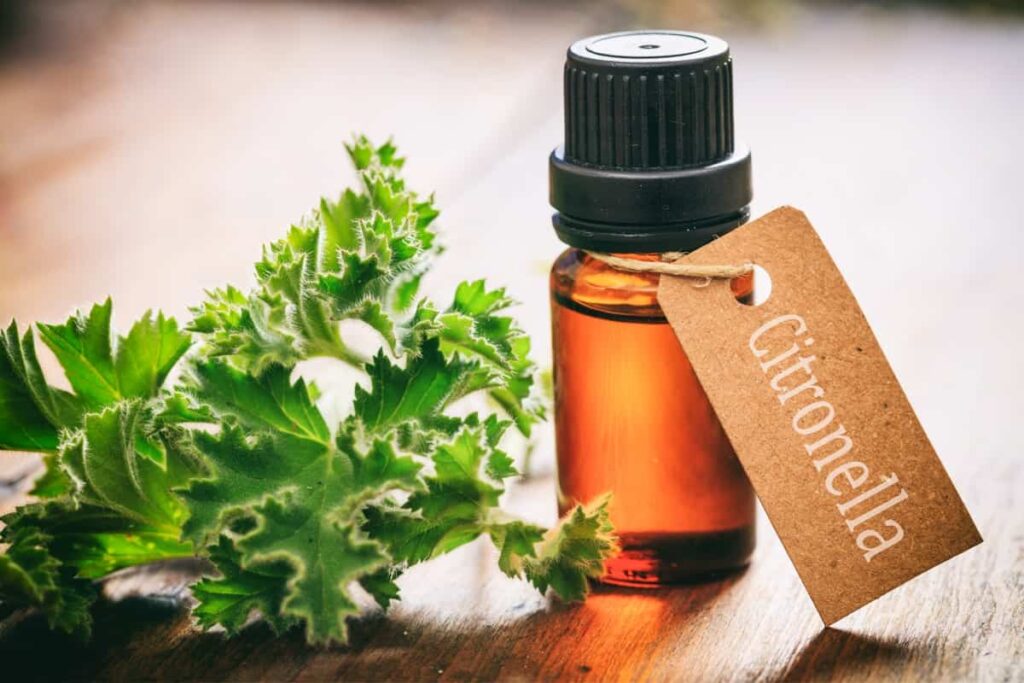
Eucalyptus oil is another potent insect repellent against mosquitoes, flies, and ticks. Dilute eucalyptus oil in water or combine it with other oils like lemon or lemongrass for added effectiveness. Cedarwood oil has long been used to ward off insects due to its strong aroma and properties that disrupt their nervous systems. It can be applied directly onto wooden surfaces in your garden or diluted with carrier oils for spraying on plants.
How to Make Homemade Pest Repellent Sprays: DIY Pest Control Recipe
Combine dish soap (one teaspoon) with one quart of water to make a basic homemade pest-repellent spray. The dish soap helps to suffocate and deter pests like aphids and mites. Mix the solution well, making sure that the soap is fully dissolved. You can add these essential oils to increase the effectiveness of the spray. Peppermint oil, for example, is known for repelling ants and spiders. Add 15 drops of Peppermint oil to your mixture and shake well before use.
In case you missed it: Pests Affecting Tomato Crops at Flowering Stage: Symptoms, Control, and Prevention
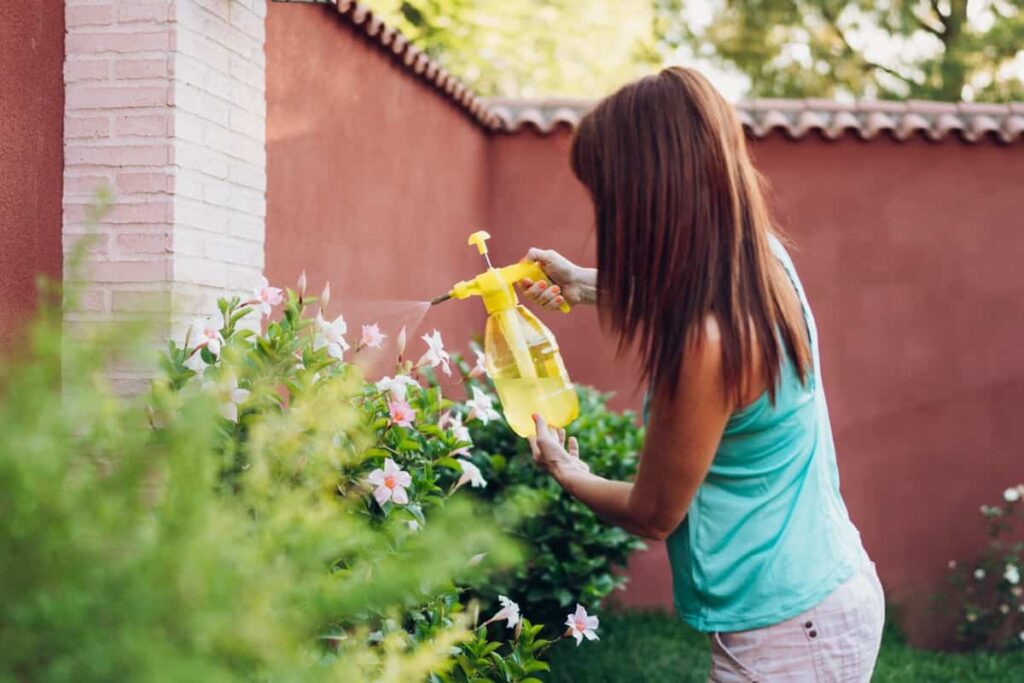
Another option is garlic-infused water spray. To make this natural insecticide, crush several garlic cloves and steep them in hot water overnight. Strain out the garlic solids and transfer the liquid into a spray bottle. This potent mixture will help keep away pests like mosquitoes and beetles.
Using Companion Planting to Deter Garden Pests Naturally
Companion planting is an effective method to deter garden pests without using harmful chemicals. By strategically selecting plant combinations, you can create a balanced ecosystem that naturally repels unwanted insects. Certain plants have properties that act as natural pest repellents. For example, planting marigolds alongside your vegetables can help deter aphids and nematodes.
The strong scent of marigolds masks the smell of nearby crops, making it difficult for pests to locate their desired food source. Similarly, planting herbs like basil and rosemary near your vegetable patch can prevent pests like beetles and flies. These aromatic plants release unappealing oils to many insects, effectively deterring them from feasting on your precious plants. In addition to using companion plants with pest-repellent properties, interplanting different types of crops can also confuse and discourage pests.
The Role of Beneficial Insects in Controlling Garden Pests
These creatures play an important role in maintaining the delicate balance of your garden ecosystem by preying on harmful pests. Ladybugs are one important beneficial insect. With their bright red or orange bodies and black spots, they are not just a pretty sight but effective predators too. They feed on mealybugs, aphids, and soft-bodied insects that can wreak havoc on your plants.
Another helpful insect is the lacewing. Their larvae have an insatiable appetite for aphids and other small insects. These tiny wasps lay their eggs inside caterpillar hosts, neutralizing them without harming your plants. By attracting beneficial insects to your garden through diverse plantings and providing them with suitable habitats like flowering shrubs or native grasses, you can create a natural defense system against unwanted pests.
Organic Pest Control Methods for a Healthy Home Garden
One of the best ways to prevent pests is by practicing good gardening techniques. Keep your plants healthy and strong through proper watering, fertilization, and mulching. A healthy plant is more resistant to pest attacks. Companion planting is another natural method to deter garden pests. Certain plants have properties that repel insects or attract beneficial ones that prey on pests. For example, marigolds can help keep aphids away from your vegetables.
In case you missed it: Top 20 Best Indoor Gardening Systems to Buy This Year at Cheap Price
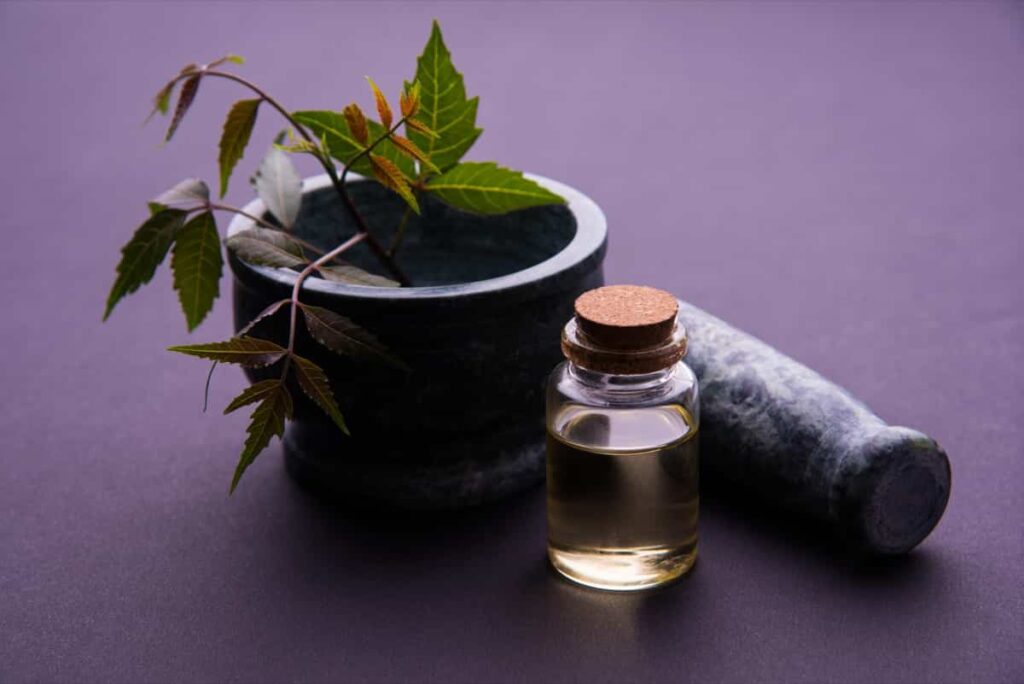
Neem oil and diatomaceous earth are popular natural garden pest repellents you can use in your home garden. It acts as an insect growth regulator, while diatomaceous earth cuts through the exoskeleton of insects, causing them to dehydrate and die. Preventing and managing pest infestations organically requires vigilance throughout the growing season. Regularly inspect your garden plants for signs of pest damage so you can take action before it becomes a bigger problem.
Creating a Balanced Ecosystem to Minimize Garden Pest Infestations
Creating a balanced ecosystem is key to reducing and minimizing pest infestations. One way to achieve this balance is by planting various flowers, herbs, and vegetables that act as natural repellents or attractants for beneficial insects. In addition to planting strategically, it’s important to avoid using synthetic pesticides or chemical fertilizers that can disrupt the delicate balance of your garden ecosystem. Instead, opt for organic methods such as homemade sprays made from essential oils or using physical barriers like row covers or netting.
Natural Ways to Repel Common Garden Pests like Aphids and Slugs
Aphids and slugs are common garden pests that wreak havoc on your plants. One effective method is using companion planting techniques. Planting marigolds, chives, or garlic near susceptible plants can deter aphids due to their strong scents. Slugs dislike certain herbs like rosemary and sage, so incorporating them into your garden can help keep the slimy invaders at bay.
Another natural approach is utilizing physical barriers. You can cover vulnerable plants with a fine mesh netting or row covers for aphids to prevent them from landing and feeding on the leaves. To deter slugs, create a barrier by placing copper tape around the base of your plant pots or creating a ring of diatomaceous earth around the plants.
Utilizing Physical Barriers and Traps for Pest Prevention in Gardens
Physical barriers and traps can be a highly effective solution for keeping pesky pests out of your garden. These methods work by physically blocking or capturing pests, preventing garden plants from causing damage to your plants. One common example of a physical barrier is a fence or netting surrounding your garden area. This can keep larger animals like rabbits or deer from munching on your precious crops.
In case you missed it: Plants Soil pH Chart: Optimal Values for Vegetables, Flowers, Trees, Herbs, and Shrubs
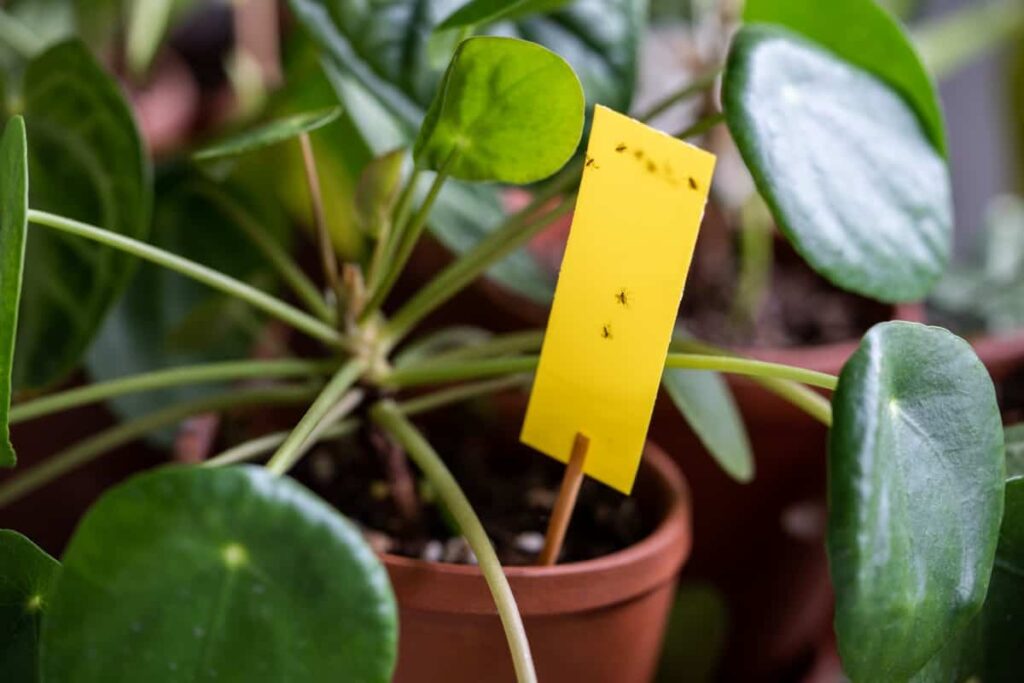
Traps are another useful tool in the battle against garden pests. Sticky traps coated with adhesive attract flying insects such as aphids and whiteflies, trapping them before they can infest your plants. Another type of useful trap is the pheromone trap, which uses synthetic hormones to lure specific insects into a sticky surface.
Incorporating Natural Predators to Control Garden Pest Populations
Ladybugs are one such predator that can be beneficial for controlling aphids, mealybugs, and other soft-bodied insects. These tiny red beetles may seem harmless, but they have a voracious appetite for pests. You can attract ladybugs to the garden by planting flowers like dill, fennel, or yarrow.
In case you missed it: Vegetable Yield Per Acre in India: Average Vegetable Production Per Acre Chart
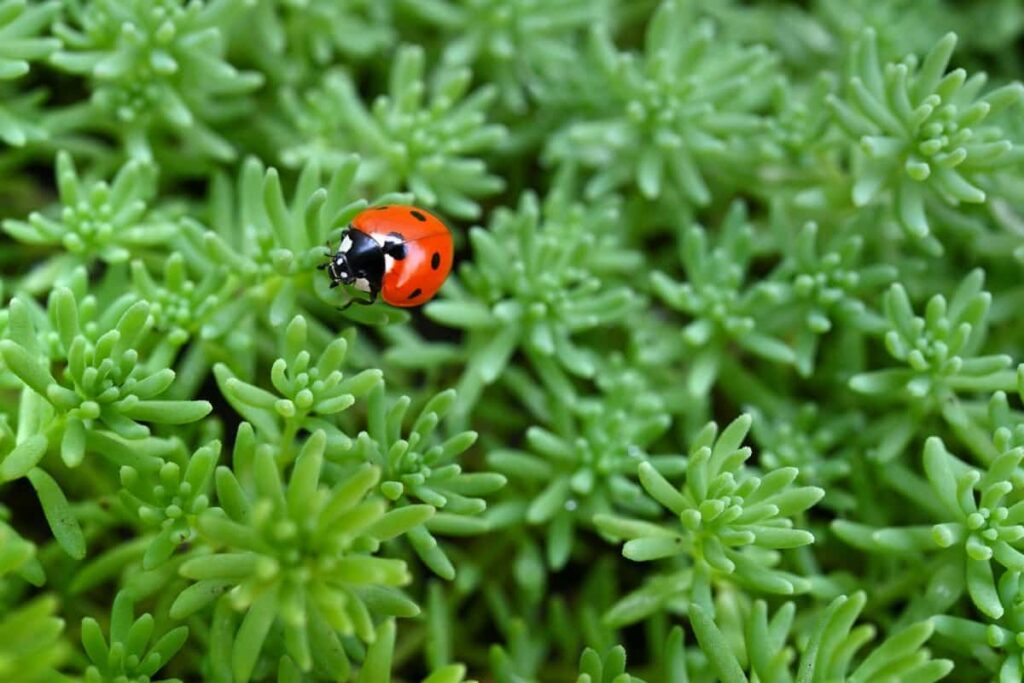
Another helpful predator is the praying mantis. These fascinating creatures feed on various insects, including caterpillars, beetles, and even small rodents. Birds also play an important role as natural pest controllers. Attracting birds to your garden can help reduce insect populations significantly. Plant trees that produce berries or seeds as food sources for birds while providing birdhouses or birdbaths as shelter options.
The Use of Diatomaceous Earth and Neem Oil as Natural Pest Repellents
Neem oil has been used as traditional medicine and comes from the neem tree. It acts as a repellent by disrupting the feeding behavior of pests like aphids, mealybugs, and caterpillars. To use neem oil as a spray, mix it with water according to the instructions on the bottle. Then, apply it directly to your plant’s foliage. The smell may not be pleasant for humans, but rest assured that it will deter unwanted insects.
Diatomaceous earth is another powerful tool in organic pest management. This powdery substance dehydrates insects upon contact with fossilized remains of aquatic organisms called diatoms. Sprinkle diatomaceous earth around your plants or create a barrier around vulnerable areas such as seedlings or newly transplanted crops. Just make sure to reapply after rainfall.
Preventing and Managing Garden Pest Infestations with Organic Practices
One of the key principles of organic pest control is maintaining a healthy garden ecosystem. This involves promoting biodiversity by planting a variety of different crops and flowers. Companion planting is another effective technique in organic pest management. Certain plants have natural repellent properties that help deter pests from your garden. For example, marigolds planted near tomatoes can repel aphids while attracting beneficial insects.
Physical barriers and traps also play a significant role in preventing pest infestations naturally. Installing row covers over susceptible crops can prevent flying insects from laying eggs on the leaves. Additionally, sticky traps placed strategically around the garden can catch crawling pests like slugs and snails. Using homemade insecticides from natural ingredients such as garlic, chili peppers, or soap solution is another eco-friendly method for controlling garden pests. These sprays are easy to make at home and won’t harm beneficial insects or pollinators.
Summary of Best Natural Garden Pest Repellents
| Pest Repellent Method | Benefits | Examples |
| Homemade Pest Repellent Sprays | Cost-effective | Garlic spray: Mix garlic cloves with water |
| Companion Planting | Deters pests like beetles, flies, aphids, and nematodes naturally | Planting marigolds alongside your vegetables, planting herbs like basil and rosemary near your vegetable patch |
| Beneficial Insects | Controls pests organically | Ladybugs eat aphids |
| Physical Barriers & Traps | Prevents pests from reaching plants | Copper tape keeps slugs away |
| Use neem oil | Prevent pests like aphids, mealybugs, and caterpillars | Mix neem oil with water based on the instructions |
Conclusion
Natural garden pest repellents are a safe and eco-friendly alternative to chemical pesticides. They consist of organic ingredients that naturally repel pests without harming beneficial insects or polluting the environment. These repellents can take various forms, including homemade sprays, companion planting strategies, physical barriers, and attracting natural predators. Natural garden pest repellents offer numerous benefits, making them a preferred choice for gardeners. They are safe to use around children and pets since they do not contain harmful chemicals found in conventional pest control products.
- How to Raise Pigs in Your Own Backyard: A Comprehensive Guide
- Budget Friendly Sheep Shed Ideas: Cheap and Low-Cost Tips
- How Much Do Cattle Farmers Make: Revenue Streams in Cattle Farming
- Management Pests and Diseases in Your Cotton Field
- Sheep Farming Business Plan for Beginners
- Aquaponic Farming at Home: A Step-By-Step Guide
- Profitable Village Farming Business Ideas in 2024
- High-Yield Aquaculture: Fast-Growing Fish for Farming
- Effective Fish Pond Construction Techniques for Beginners
- Irrigation and Water Management in Pineapple Farming
- Blossom to Harvest: Mastering Flowering and Pollination in Papaya Farming
- Pig Fattening Essentials: From Selection to Sale for Beginners
- Raising Wagyu Cattle: A Complete Guide for Premium Beef Production
- Soil Types and Their Water Holding Capacity
- Optimizing Irrigation Schedules for Coconut Groves for Enhanced Yield
- Espresso Your Garden: Coffee Grounds for Healthier Acid-Loving Plants
- The Best Soil Mix for Snake Plants: How to Mix Your Own Snake Plant Soil
- Green Thumb Success: Expert Tips for Cultivating Greenhouse Beans All Year Round
- Bloom All Year Round: The Ultimate Guide to Indoor Hyacinth Care
- Eco-Friendly Gardening: How to Make Liquid Fertilizer from Kitchen Waste
- Ultimate Guide to Grow Anise in Pots: Explore Seed Propagation to Harvesting
- Guide to Raising Chester White Pigs: Discover Breed Facts to Growth Management
- Mastering the Elegance: The Ultimate Guide to Weeping Cherry Tree Care, Planting, and Maintenance
- Ultimate Guide to Planting Garlic in Grow Bags: Growing Strategies for Beginners
- How to Fix Spider Plant Leaf-Related Problems: Natural and Organic Remedies
- 10 Reasons Why Your Tulsi Plant is Shedding Leaves: Home Remedies and Solutions
- Optimizing Growth and Yield: The Advantages of Palm Bunch Ash Fertilizer
- Utilizing Neem Oil Extract as a Natural Pesticide for Hydrangea
- From Soil to Harvest: Various Ways in Which Farmers Can Use AI Tools
- Steps to Encourage and Induce Citrus Flowers: A Comprehensive Guide
- How to Fix Snake Plant Leaf-Related Issues: Natural and Organic Remedies
- Transform Your Garden into a Fragrant Oasis with Raat Ki Rani (Night Blooming Jasmine)
- Discover the Ideal Chicken Breeds for Philippine Farms
- How to Create a Poultry Egg Farm Business Plan for Profits
- Grow Lemon Cucumbers Like a Pro: Insider Techniques for Bountiful Yields
- Ultimate Guide to Caring for Your Pink Princess Philodendron: Tips for Thriving Variegation
